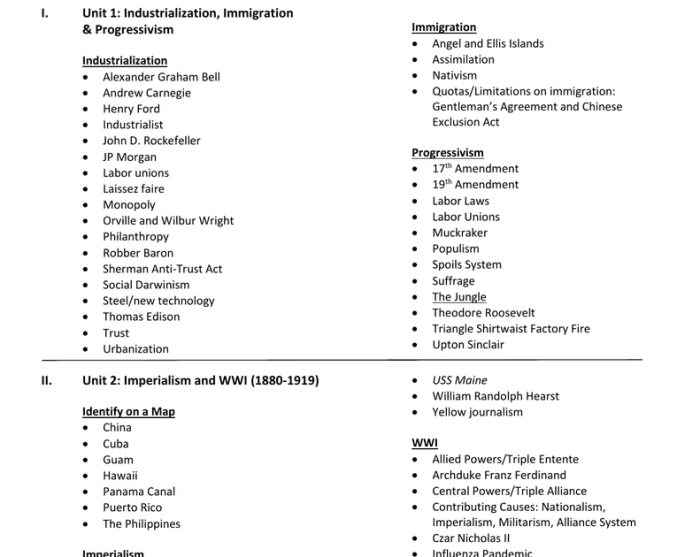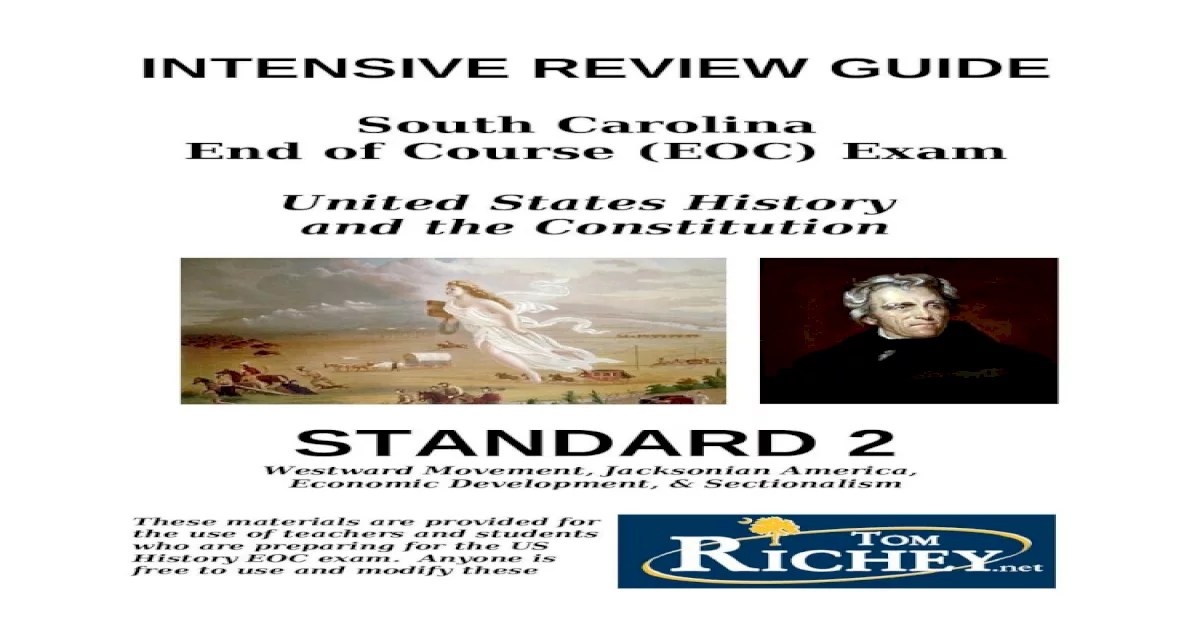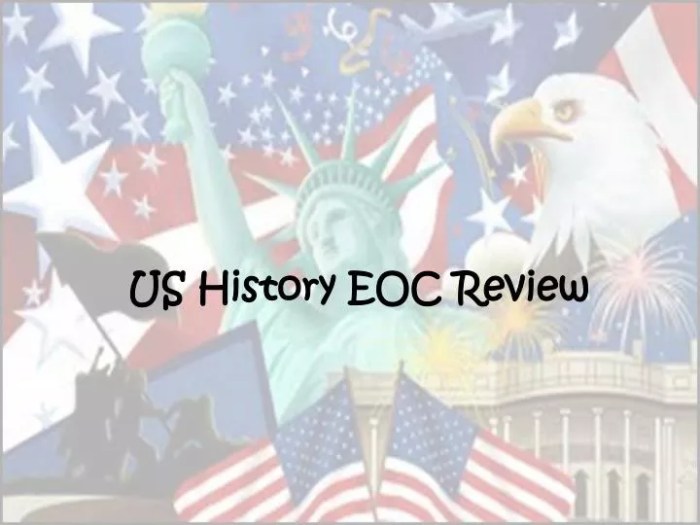US History EOC Review Guide Answers embarks on a captivating journey through the annals of American history, providing a comprehensive resource for students preparing for their End-of-Course exams. This guide offers an in-depth exploration of key historical periods, constitutional principles, economic and social developments, foreign policy initiatives, and cultural expressions that have shaped the United States into the nation it is today.
Delving into the heart of American history, this guide unveils the pivotal events that have left an indelible mark on the nation’s trajectory. From the American Revolution to the Civil War and the World Wars, readers will gain a profound understanding of the challenges and triumphs that have forged the American spirit.
Historical Periods and Events

US history can be divided into several major periods, each characterized by distinct events and developments.
The Colonial Period(1607-1783) saw the establishment of European colonies in North America and the growth of a distinct American identity.
The American Revolution
- The American Revolution (1775-1783) was a war fought between the American colonists and Great Britain.
- The colonists declared independence in 1776 and established the United States of America.
The Civil War
- The Civil War (1861-1865) was a conflict between the Northern and Southern states over the issue of slavery.
- The war resulted in the abolition of slavery and the reunification of the country.
The World Wars
- World War I (1914-1918) was a global conflict that involved the United States.
- The United States emerged from the war as a major world power.
- World War II (1939-1945) was another global conflict that involved the United States.
- The United States played a key role in defeating Nazi Germany and Japan.
Constitutional Principles and Documents

The US Constitution enshrines fundamental principles that have shaped American society and government. These principles include:
- Popular Sovereignty:Government derives its power from the consent of the governed.
- Limited Government:Government is restricted in its scope and powers to protect individual rights.
- Separation of Powers:Power is divided among three branches of government (legislative, executive, and judicial) to prevent tyranny.
- Checks and Balances:Each branch of government has powers to check the other branches, ensuring no one branch becomes too powerful.
- Rule of Law:All citizens, including government officials, are subject to the law.
Bill of Rights
The Bill of Rights, comprising the first ten amendments to the Constitution, guarantees individual freedoms. It includes:
- Freedom of speech, religion, press, assembly, and petition
- Right to bear arms
- Protection against unreasonable searches and seizures
- Right to due process of law
- Right to a fair trial
The Bill of Rights has had a profound impact on American society, safeguarding individual liberties and ensuring a more just and equitable society.
Declaration of Independence
The Declaration of Independence, adopted in 1776, proclaimed the American colonies’ independence from Great Britain. It asserted the natural rights of individuals to “Life, Liberty and the pursuit of Happiness.” The Declaration also established the principles of popular sovereignty and the right to revolution.
It remains a powerful symbol of American ideals and has inspired countless movements for freedom and self-determination worldwide.
Economic and Social Developments

The US economy has undergone a remarkable transformation from its colonial origins to the present day. Initially rooted in agriculture and trade, it has evolved into a global economic powerhouse, driven by industrialization, urbanization, and technological advancements. These factors have significantly shaped the social fabric of the United States, leading to social movements that have influenced the nation’s values and institutions.
Evolution of the US Economy
- Colonial Era:Agriculture and trade dominated the economy, with a reliance on cash crops like tobacco and cotton.
- 19th Century:Industrialization began to transform the economy, leading to the growth of cities and the rise of manufacturing.
- 20th Century:Technological advancements, such as the automobile and the computer, spurred economic growth and urbanization.
- Present Day:The US economy is characterized by a service-based economy, with a focus on technology, finance, and healthcare.
Impact of Industrialization, Urbanization, and Technological Advancements
Industrialization, urbanization, and technological advancements have had a profound impact on US society:
- Industrialization:Led to the creation of new industries, increased productivity, and a rise in the standard of living.
- Urbanization:Resulted in the growth of cities, leading to social and economic challenges such as overcrowding, pollution, and crime.
- Technological Advancements:Transformed communication, transportation, and healthcare, making life easier and more convenient.
Social Movements and Their Influence
Social movements have played a significant role in shaping US society, advocating for change and equality:
- Abolitionist Movement:Fought to end slavery and led to the Civil War.
- Civil Rights Movement:Challenged racial segregation and discrimination, resulting in landmark legislation like the Civil Rights Act of 1964.
- Women’s Suffrage Movement:Advocated for women’s right to vote, culminating in the 19th Amendment.
Foreign Policy and Diplomacy
The United States has engaged in various foreign policy initiatives throughout its history, shaping its role in global affairs. These initiatives have ranged from isolationism to interventionism, with the country’s involvement in international conflicts having a significant impact on its foreign policy.
Diplomacy and International Organizations
Diplomacy has played a crucial role in US foreign policy, with the country actively participating in international organizations such as the United Nations and NATO. These organizations provide platforms for dialogue, cooperation, and conflict resolution, allowing the US to engage with other nations and address global issues.
Spanish-American War
The Spanish-American War (1898) marked a turning point in US foreign policy, leading to the country’s acquisition of overseas territories and its emergence as a global power. The war’s outcome resulted in the US gaining control of Cuba, Puerto Rico, Guam, and the Philippines, expanding its influence in the Caribbean and the Pacific.
Cold War
The Cold War (1947-1991) was a period of intense rivalry between the United States and the Soviet Union. The US adopted a policy of containment, aiming to prevent the spread of communism. This policy involved military alliances, economic aid, and covert operations, shaping the geopolitical landscape of the world.
Cultural and Artistic Expressions: Us History Eoc Review Guide Answers
The United States has a rich and diverse cultural heritage that has been shaped by the contributions of many different cultures and traditions. Throughout its history, the United States has experienced numerous cultural and artistic movements that have reflected the changing social and political landscape of the nation.
One of the most significant cultural and artistic movements in US history was the Transcendentalist movement of the mid-19th century. Transcendentalists believed in the inherent goodness of nature and the importance of individual intuition and experience. They rejected the materialism and rationalism of the Enlightenment and emphasized the importance of spirituality, emotion, and imagination.
Influence of Immigration, Diversity, and Technology on American Culture
Immigration has played a major role in shaping American culture. The United States has been a destination for immigrants from all over the world, and these immigrants have brought with them their own cultural traditions and artistic expressions. This diversity has led to a vibrant and dynamic American culture that is constantly evolving.
Technology has also had a major impact on American culture. The development of new technologies, such as the printing press, the telegraph, and the internet, has made it possible for ideas and cultural expressions to spread more quickly and easily than ever before.
This has led to a more globalized culture, in which American cultural products are consumed by people all over the world.
Impact of American Art, Literature, and Music on Global Society, Us history eoc review guide answers
American art, literature, and music have had a profound impact on global society. American artists, writers, and musicians have been at the forefront of many cultural and artistic movements, and their work has been influential in shaping the way that people around the world think about art, literature, and music.
American popular culture has also had a major impact on global society. American films, television shows, and music are consumed by people all over the world, and they have helped to spread American values and culture around the globe.
Commonly Asked Questions
What is the purpose of the US History EOC Review Guide Answers?
The US History EOC Review Guide Answers are designed to assist students in preparing for their End-of-Course exams in American history, providing a comprehensive review of key historical periods, constitutional principles, economic and social developments, foreign policy initiatives, and cultural expressions.
What historical periods are covered in the guide?
The guide covers major historical periods in US history, including colonial times, the American Revolution, the Civil War, the Reconstruction Era, the Industrial Revolution, the Progressive Era, the World Wars, the Cold War, and the post-Cold War era.
What constitutional principles are discussed in the guide?
The guide explains the principles enshrined in the US Constitution, including the separation of powers, checks and balances, federalism, individual rights, and due process of law.